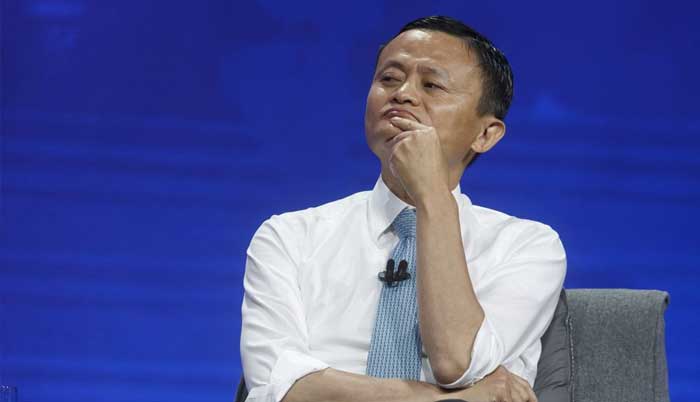![]() Home > World Business
Home > World Business
Millennials Are Helping Jack Ma's Financing Firm Become a Debt Giant

Jack Ma Photographer: Cole Burston/Bloomberg
![]() October 17th, 2017 | 10:21 AM |
October 17th, 2017 | 10:21 AM | ![]() 900 views
900 views
BLOOMBERG.COM
They’ve made billions of dollars helping sell everything from iPhones to hairdryers on China’s burgeoning online shopping platforms. Now, tech giants led by Alibaba Group Holding Ltd.’s finance affiliate are making money off the loans consumers use to buy those products.
Amid surging demand from cash-strapped Chinese millennials, companies such as Ant Financial -- controlled by Alibaba’s billionaire founder Jack Ma -- have been extending more consumer loans. The firms are then packaging the debt into complex financial products that they then sell on to investors, with Ant Financial selling at least 149 billion yuan ($23 billion) of the so-called asset-backed securities this year, according to data compiled by Bloomberg and local research firm China Securitization Analytics.
But the new practice is raising red flags for some analysts, who say there needs to be more transparency about how the securities, known as ABS, are created.
“For this type of ABS, there are certain questions that need to be addressed,” said Jerome Cheng, a senior vice president in Hong Kong at Moody’s Investors Service. “What are the criteria based on which a lender will decide to grant loans to underlying borrowers? How do the lenders collect information about borrowers? To what extent will the underlying receivable performance deteriorate when the economy faces difficulties?”
Oftentimes, the finance firms -- which include one run by web retailer JD.com Inc. -- raise funds for such loans by issuing ABS that are tied to lending itself.
Few questions were asked when Miuki Wang, a graduate student in Shanghai, got a 10,000 yuan loan for a trip to London this summer in a matter of seconds, all through an app on her smartphone. Ant Financial approved her request at 14.6 percent annual interest through its mobile-based lending service "Jiebei," which means "Just Borrow."
Wang paid off the debt in September, and plans to borrow more online.
“Money will devalue over time,” she said. “Why not just spend it all now?”
Securitized products that bundle such obligations are meant to spread the risks among different investors. The tech companies can’t take deposits like banks, so the ABS, which are generally sold in private placements to institutional investors, give them a way to raise funds. The latest ABS from Ant Financial that’s backed by loans through its Jiebei service pays a 5.5 percent coupon for the senior tranche, according to data compiled by Bloomberg.
ABS attracted global regulatory scrutiny after the 2008 financial crisis, when loans to subprime home buyers in the U.S. went bad. Since 2012, China has cautiously revived approvals of the products.
“In the short term, default risks for consumer loan ABS are very low because the underlying assets are composed of a number of loans in small sizes,” said Zuo Fei, an executive director and head of the ABS group in the investment banking division of China Merchants Securities Co. in Shenzhen. “These ABS products will be safe, unless systemic risks emerge in the economy and cause widespread defaults in consumer loans.”
Risk Models
Officially named Zhejiang Ant Small & Micro Financial Services Group Co., the company has built more than 100 risk forecast models and more than 3,000 risk control strategies for lending, it said in response to questions on the products’ potential risks. Moody’s estimated in an August report that the outstanding amount of consumer loans extended by Ant Financial was about 200 billion yuan as of March 31.
“We comprehensively analyze clients’ credit and effectively manage risks to control non-performing ratios,” the company said in an emailed statement. “Ant Financial strictly follows relevant regulatory rules in disclosing information to investors."
The China Securities Regulatory Commission, which regulates ABS sold on the nation’s two exchanges, hasn’t responded to questions on the risks and disclosure requirements. According to CSRC regulations, issuers should disclose in a prospectus the asset pool’s overall statistics, screening standards and forecasts on cash flows. For privately placed products, prospectuses generally aren’t disclosed to the public.
Internet platforms that sell securities such as ABS do not really have all necessary risk management protocols, according to Zhu Ning, deputy director of the National Institute of Financial Research at Tsinghua University.
“The lack of information disclosure for ABS is a realistic concern as investors are actually investing on the government’s creditworthiness, rather than the fundamentals of any specific security,” said Zhu, author of "China’s Guaranteed Bubble: How Implicit Government Support Has Propelled China’s Economy While Creating Systemic Risk."
JD.com, the nation’s second-biggest Internet mall, has sold 9.5 billion yuan of consumer-loan ABS this year and Baidu Inc. issued 1.3 billion yuan, according to data compiled by Bloomberg and China Securitization Analytics. Beijing-based financial technology firm Pintec Group, which sold ABS backed by installment payments on online travel platform Qunar in June, plans a second offering.
“When more and more companies have ability to build a track record of asset quality, certainly you will see more participants,” said Barry Freeman, Pintec’s co-founder.
Yan Hong, Shanghai-based professor at Shanghai Advanced Institute of Finance, said information disclosure about the underlying assets of consumer-loan ABS generally isn’t sufficient, even to those who invest in them.
“Regulators need to strengthen information disclosure requirements,” said Yan. “It may not be practical to disclose all the details of each loan in the pool, but issuers or underwriters should at least disclose basic statistics of the asset pool.”
Source:
courtesy of BLOOMBERG
by Bloomberg News
If you have any stories or news that you would like to share with the global online community, please feel free to share it with us by contacting us directly at [email protected]